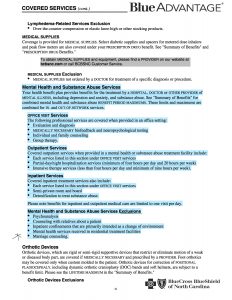Written by: Michelle Topal, MSW, LCSW – Psychotherapist Raleigh-Durham NC
So, we got our umteenth call today from someone seeking couples therapy who had talked with BCBS customer service. And once again, they were told that couples therapy is a covered benefit depending on how the therapist “codes it” and to tell the therapist this. In this post, I have included just one example of a BCBS plan booklet (illustrated to your right) with what is included, and more importantly, excluded in the mental health benefits for BCBS members.
It is clear (and has been for many years) that couples therapy is not a covered benefit by BCBS, and pretty much all health insurance plans (I will give a brief explanation of why this is, later in this post). So, by telling people that couples counseling or marital therapy is covered by their plan, BCBS customer service is giving incorrect information. But not only are they giving misinformation, they are telling people to ask therapists to commit insurance fraud. Because according to BCBS “agreements”, “creative billing” is considered by them to be insurance fraud. Creative billing, by definition, is providing a diagnosis when there is none or using a covered code to get covered a service that is not covered.
Customer service’s role and responsibility is to give accurate information about people’s policies (which you see here is clearly written in the policy booklets available). They have no role to play or authority for what the treating provider does or what that provider can do in relationship to provider relations, contracting or billing at the insurance company. If customer service misinformed and over-reached once or twice, we might dismiss this as a misguided customer service person. However, this seems to happen fairly regularly when clients call BCBS to inquire about their benefits in relationship to couples counseling or marital therapy. This is sabotaging to our relationship with people calling us, since why would they doubt the information about their benefits, given by that very benefit plan?
While I have much to say about the insurance industry, and none of it positive, in this instance, it makes sense that based on the system we have, that marital therapy and couples counseling would not be covered. Health insurance is designed primarily for the treatment of medical, diagnoseable health conditions (with the exception of recent legislation mandating limited preventative services, as a cost saving measure). This is referred to as the “medical model”. And while some approaches to therapy may not necessarily be compatible with this model, it is what is required if you want the therapy to be covered by insurance. With the medical model, in order for services to be covered by insurance, it needs to meet “medical necessity”. In order for that to happen, a person has to be diagnosed with a medical condition that requires treatment, and therapy sessions are focused on the treatment and alleviation of that diagnoses. Couples cannot be diagnosed with a condition and therefore cannot meet medical necessity for treatment. This is why marital therapy is an exclusion in insurance plans.
Some have argued, that you can just give someone in the couple a diagnosis. Again, this does not change the fact that marital therapy and couples therapy are exclusions in most plans (per above illustration). Also, even if one of the partners is legitimately diagnosed (because a therapist cannot legally and ethically diagnosis someone with something that they do not have, and not be guilty of committing insurance fraud), treatment would have to focus on that diagnosis, not relational issues. And documentation in the medical record would need to accurately reflect this treatment and the response to this treatment.
So, one exception to insurance covering couples therapy or marriage counseling, would be if a plan allowed for the use of Z-codes (used to be V-codes). The question would be if the insurance plan will pay for the Diagnostic ICD-10 Z Codes (likely Z63.0 – “Problems in relationship with spouse or partner”). In order to find this out, you would ask customer service to specifically look up Z Code 63.0, and not just settle for some general answer like that they pay for all the codes. If they say Z-codes are covered, then it may indicate that marital or relationship counseling is not an exclusion, because the insurance company is not requiring that the therapy meet medical necessity. This is very unlikely. You will want to know if there are any limitations regarding number of sessions. So, make sure to ask how many sessions they will cover.
This brings us to the last issue with providing marital therapy through insurance; the medical record, HIPAA and our ethical obligations as psychotherapists. There are ethical and HIPAA considerations for therapists that make it difficult, if not impossible, for them to provide couples therapy through insurance, even if the plan allowed for this service. When working with couples and families, we cannot honor or comply with our ethical obligations and HIPAA regulations related to privacy, confidentiality and medical records, and involve insurance and an “identified client”. We have to be clear in our work and in the medical record, who the client or client unit is, and what we are doing with them and in sessions. This means we cannot have one client identified with insurance, while actually having two or more clients in the work we are doing. Clients and our medical records need to be clear on who the client is, who owns the medical record and how confidentiality (HIPAA) apply. Not being clear about this may cause the therapist to possibly run afoul of the insurance company benefits or the rights of the client or client unit. Individual therapy and couples therapy are not the same, clinically and in relationship to HIPAA. So, in addition to not committing insurance fraud by attempting to have a service that is not covered by insurance, covered, therapists need to ensure that a medical record accurately reflects the services provided and ensures HIPAA protections for all who “own” the chart. This can be tricky enough without a third party, such as the insurance company, but adding insurance makes it nearly impossible.
It is understandable that people want their marital therapy or couples counseling covered by insurance, especially if you have paid a lot for benefits that give you less and less for the money. As a consumer, I feel and experience acutely the inadequacy of our health care system, so I can relate to this expectation and anger. However, that does not mean therapists can put their licensures and livelihoods on the line, if found in violation of HIPAA or guilty of insurance fraud, in order to solve a problem for individuals that needs to be resolved on a systemic level. But the system must change….so, let us start with getting customer service at BCBS to stop misleading people about their benefits and accurately reflect the limitations, as infuriating as they may be, that exist in their plans.
Michelle Topal, LCSW is a psychotherapist in Raleigh & Durham NC who specializes in marital therapy & couples counseling, child therapy, family counseling & parenting support in Durham & Raleigh NC.






Leave a Reply
Your email is safe with us.